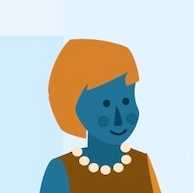For any expat parent in France, finding the best schools and higher education will be top of mind. This guide covers daycare and kindergarten as well, although this is not mandatory in France. In fact, schooling is only required between the ages of six to 16. Primary and secondary schools, higher education, language schools, and even international schools which are a popular choice for expat children in France, are also covered. So, from understating the education system in France, the grading system, all the way up to universities for your child, this guide ensures you have the information you need to successfully enroll your kids in the right school.
Advertisement
Ruben Barbosa
After work I enjoy meeting other Brazlian expats offline. We go for a beer together and it feels like home. Thanks InterNations.
Verona Torres
The idea to connext expatriates in Strasbourg fits perfectly to the city. Both are truly international.
Advertisement
Why you'll love InterNations in France
and countless possibilities for fun and friendship!
Advertisement
Advertisement
The Education System in France
What is the Education System Like in France?
France is known for having one of the best education systems in the world. With a nationally set curriculum and high academic standards, France’s school system offers traditional methods of learning.
Education Facts in France
In France, the state provides free, secular education, which is compulsory for children between the ages of six to 16. However, the majority of students in France start before this, enrolling in nursery school or kindergarten. There are four stages of education: école maternelle (daycare and kindergarten), école__primaire (primary school, also known as an elementary school in some countries), collège (middle school), and lycée (secondary school). However, children in France are only obligated to attend primary school, middle school, and secondary/high school.
The Schooling System in France
In France, the school year runs from September to July of the next year. There are five main holidays or holiday periods for students every year: All Saints, Christmas, winter, Easter/spring, and summer break. The actual dates of these holidays vary in different regions of the country.
The School Age System in France
| Type of School | Age |
Daycare and Kindergarten (école maternelle) | 2-6 |
Primary school (école primaire) | 6-11 |
Middle school (collège) | 11-15 |
Secondary/High School (lycée) | 15-18 |
France’s Grading System
| Grade | Scale | Description |
THF | 18-20 | Très Honorable (Honorable) |
TB | 16-17.99 | Très Bien (Very Good) |
B | 14-15.99 | Bien (Good) |
AB | 12-13.99 | Assez Bien (Quite Good) |
P | 10-11.99 | Passable (Satisfactory) |
P | 8-9.99 | Passable (Sufficient) |
E | 0-7.99 | Échec (Fail) |
School Hours in France
Pupils go to school for 24 to 28 hours a week, beginning at 8:30 to 16:30 (time could be later for older students). Those preparing for the baccalauréat exam, which is the exam that pupils must pass to get into university, may have to go to school for up to 40 hours a week. Depending on the region of France, students may attend school four, four and a half, or five days per week. Some schools close on Wednesdays. During school, students get two short breaks (recesses) and a minimum of a one and a half hour lunch break. Students can go home for lunch or eat at school.
Private Education
Private schools in France generally have a good reputation. They tend to benefit from impressive teaching facilities and small classes which allow for more individual attention, unlike public schools which tend to have larger classes. Classes in private schools run strictly from Mondays to Fridays.
Main Differences and Similarities between Private and Public Schools
Public School
- Secular
- Smaller classes and general attention
- Some schools are closed on Wednesdays
Private School
- Does not have to be secular
- Smaller classes and more individualized attention
- Strict school schedule from Monday to Friday
- Receive little funding from the State so you will have to pay tuition fees
Similarities
- The curriculum is the same
- Teachers are all hired by the State
- AffordabilityFunded by the State, so education is free
In France, there are two types of private schools: sous contrat (contracted) or hors contrat (non-contracted).
School Costs
State-contracted private schools are funded by the government and must follow the national curriculum and students work towards the baccalauréat examination. State-contracted schools are known for their intensive education for non-French speaking students. Tuition fees can be quite reasonable with some as low as 300 EUR (336 USD) per year. Keep in mind that there could be extra costs not included such as registration fees and lunches. Enrolment is conducted on a first come, first served basis. For any required documents for admission and details on the application process, it is best to contact the school directly.
The private institutions called hors contrat are not funded or controlled by the government. Therefore, they can be significantly more expensive than state-contracted private schools. These schools are also able to create their own curriculum including sports, subjects in the arts, even in religion (unlike state schools). International and bilingual schools usually fall under this category. Contact the school directly for details on the application process and enrolment requirements.
Religious Schools in a Secular State
Around 90% of private hors contrat schools are Catholic. In contrast, French state-contracted and public schools are all secular as they follow the French regime of separating church and state known as laïcité. A law in 2004 banned the wearing of headscarves by Muslim girls and skullcaps by Jews in schools. Therefore, students wishing to follow their religious beliefs within the education system can attend private schools, some of which are highly regarded. The Muslim institution Lycée-Collège Averroès, for example, has previously been ranked as France’s best-performing secondary school by Le Parisien.


Daycare and Kindergarten
Preschool and kindergarten are available in France for young children. They typically start kindergarten at the age of three, but some begin as young as two. However, neither preschool nor kindergarten is mandatory in France, although it is strongly recommended for expats. Daycare/childcare is also an option for children under three. These childcare establishments are known as crèches or garderies in French. Daycare/childcare and kindergarten fees are outlined in the sections below.
Daycare (crèches)
It is possible for mothers in France to go back to work soon after birth, as the French government provides state-run daycare centers called crèches. Maternity leave tends to end when the baby is three months old, and crèches accept babies from a young age. A list of crèches in the area can be found at the local town hall, the mairie. It is worth signing up as early as possible because demand is high.
There are three types of crèche in France:
- La crèche parentale: Non-profit and is managed by parent associations, with them sharing the cost for food and equipment equally. They also often employ the help of qualified nannies.
- La crèche d’enterprise: Offered by a company and provides professional childcare for its staff.
- La crèche familial: A family crèche, in which a childcare professional is hired to look after children from different families under one roof, and the cost is then split between the families.
As crèches are typically operated through local mairies, childcare fees are generally subsidized, with parents responsible for paying only a small price, often determined based on income.
Other Childcare Options
Nanny
A French nanny is called a nounou and will have been professionally trained and approved by the state. The state will also cover the nanny’s social, health, and retirement benefits. Nannies may care for up to five children at a time, depending on the age of the children. A nounou should be given a contract that specifies their hours and monthly salary. They must be formally paid with a pay slip. If they are caring for your children for more than five hours a week, it is necessary to declare yourself an employer with the URSSAF. As for what to pay your children’s nounou, it is worth talking to other parents in your area to get a better idea.
Babysitter
Babysitters can be casually paid and employed as and when necessary. They are often recommended through word of mouth or found online. If the babysitter is a minor, the babysitter’s parents should be made aware of the work arrangements. Only babysitters over 15 can be paid, and they should have civil liability insurance. Babysitters in France tend to charge anywhere between 6 to 12 EUR (7–13 USD) per hour, per child.
Au Pair
Au pairs often come with fixed salaries from au pair agencies, and it is customary to provide them with accommodation and an agreed amount of pocket money, which will be decided on before their arrival. Au pairs tend to come from abroad to learn French or another language, so in some cases, communication might be an issue or an excellent opportunity for your child to learn a foreign language.
Kindergarten
Since kindergarten is state-run, there is no cost or fee. Parents must enroll their children with the following required documents:
- Birth certificate
- Vaccination certificate and a medical report from a French doctor
- Proof of residence (e.g., electricity or phone bill)
- Passport
- Former school records
Kindergarten is divided into junior and senior kindergarten. There are three sections: petite (ages 2-4), moyenne (ages 4-5), and grande (ages 5-6).
The Educational Approach of Kindergarten in France
The educational approach and primary purpose of kindergarten in France are to integrate toddlers to the social environment and help them develop basic coordination skills. Oral expression, communication, and self-awareness are encouraged. Towards the final years of kindergarten, kids are taught reading, writing, and math in preparation for primary school. While not compulsory, kindergarten is highly recommended, particularly for foreign and expat children. It is the perfect way to introduce them to the French language and ensure they do not fall behind during their primary school years.


Primary and Secondary Schools
If you are wondering about the best primary and secondary schools for your child in France, there are some basics you will need to understand before starting on your research, comparing schools, and getting your child enrolled.
Primary School (École Primaire) in France
Primary school, known as an elementary school in some places, is compulsory for children between the ages of six and eleven and is free. A typical schedule includes a 24-hour school week. It is divided into five levels: cours préparatoire, cours élémentaire 1, cours élémentaire 2, cours moyen 1, and cours moyen 2. The five classes are abbreviated CP, CE1, CE2, CM1, and CM2. The final two years of elementary school (CM1 and CM2) prepare students for middle school.
If this is your child’s first time attending school, they will need to register at the local mairie. The requirements are:
- Birth certificate
- Vaccination certificate and a medical report from a French doctor
- Proof of residence
- Passport
- Former school records
- Must be enrolled by the June before the September start date
Middle School (Collège)
Between the ages of 11 and 15, French children attend middle school, which is also covered by the state. Timetables include a 26-hour study week (six hours per day). Most children tend to be eleven years old when they start middle school; however, some are slightly older kids as it is possible to repeat a year in elementary school. Middle school lasts four years, and the grades are called known as_cinquième, quatrième,_ and troisième — the French educational system counts down the school years rather than up.
Enrollment requirements for middle schools are:
- Birth certificate
- Vaccination certificate and a medical report from a French doctor
- Proof of residence
- Passport
- Former school records
- Completed registration form
- Two photos
- Must be enrolled by June before the September start date of the same year
Secondary School or High School
Following middle school, French teenagers must attend high school (or secondary school) from the age of 15 until at least the age of 16, although it is possible to continue on. High school is also subsidized by the government. Pupils study around 28-35 hours weekly. In France, there is more than one type of high school: a general/technological one (three years of study) meant for those wishing to access university, and a professional/vocational one (two years of study which includes 12-16 weeks of work) for those students wishing to enter the workforce immediately upon graduation.
The “Bac”
Students who choose to attend a general/technological high school have to take the baccalauréat or bac. At the end of their high school studies, students can choose to take a general baccalauréat, professional, or technological_._ The different types are subdivided into various streams according to the students’ respective focus_._ For example, the baccalauréat général includes options for natural sciences, literature, social sciences, and economics. The bac is a required exam for students to graduate high school and free of cost.
For those wishing to pursue higher education, there are many scholarships available, including for international students.
International Schools
In France, some of the best international schools have a reputation for their high-quality education and small class size. For international students, schools in France are available for children of all ages through nursery, primary, and secondary school. Lessons are usually taught in French and English, although schools occasionally teach in other languages.
Many schools for English-speaking expat children are centered around Paris but can also be found in other favorite cities such as Bordeaux and Toulouse. Schools cater to German, Iraqi, Japanese, Spanish, Swedish, and Russian students.
International School Curriculum Options
Some schools teach the internationally recognized qualification, International Baccalauréat, and follow global standards, making for a smoother transition to other schools for expat students who move around a lot. Meanwhile, some schools follow UK- or US-based curriculums which can lead to the GCSEs, GCE A levels, American High School Diploma, SAT, or PSAT. Some teach the French Option International du Baccalauréat (OIB), which provides admission to higher education in France.
Pros and Cons to an International School Education
If you are wondering whether to enroll your child in an international school or not, consider their schooling level. For older students with more difficult and complex classes, an international school may be a good idea because it allows them to continue with their studies in a language they are comfortable with. It is also a great way to expose them to different cultures and other international students. You might find that there are plenty more extracurricular activities offered at international schools versus the private state-funded and public schools.
However, a major con of joining an international school is that it may take your expat child longer to learn French and integrate into the French culture. It may also be harder for your kid to make long-term friends as many international school kids tend to move away after a while. Remember: many are foreign, nomadic, and expat families just like you.
Be warned that tuition fees for international schools can also be quite high. It is best to research and compare your options via the schools’ websites.
Prominent International Schools in France
- Bordeaux International School (British school)
- International School of Nice
- International School of Béarn (British school)
- The International School of Toulouse
- The European School of Strasbourg
The majority of international schools are based in Paris. These include:
- Marymount International School, Paris (Catholic school)
- Bilingual International School of Paris
- Lycée International Montessori
- Lycée-Collège Edouard Branly
- College International De Fontainebleau
Applying to an International School
It is advisable to apply as early as possible to international schools in France, which often have long waiting lists. However, in some cases, it is possible to join a school mid-term. International school admission requirements vary from school to school, so it is best to check out the school’s website or contact them directly for information on the application process. Keep in mind that preference may be given to some students over others based on nationality.
International Method Schools in France
Schools such as Montessori and Steiner-Waldorf schools focus on teaching their own educational philosophies yet are still recognized by the French state, and might even offer traditional qualifications such as the French baccalauréat. Mainly these schools are geared towards younger students, but older students are accepted at some institutions.


Higher Education
With more than 3,500 higher education institutions, France’s university tuition fees are pretty affordable. The country is also home to a few of the world’s best universities. Université PSL and Ecole Polytechnique, for example, are ranked as the 50th and 65th best university in the world, respectively.
Public Universities
There are more than 80 public universities in France which are subsidized by the French national government, keeping tuition fees affordable. Students have roughly 36,000 programs to choose from. Most courses are offered in French, although some courses can be taken in other languages such as English (more than 1,000 programs). Students can study economics, law, humanities, mathematics, and English, and their studies usually include an internship.
Expat students will not feel lonely as there is a large international student community in France. French universities are often keen on attracting foreign students. In fact, 12% of students pursuing higher education in France are from abroad. It is the fourth most popular study abroad destination.
Higher education is divided into three levels of diplomas:
- License (bachelor’s degree) – three years of study
- Master’s degree – two years of study
- National doctoral degrees (Ph.D.)– three years of study
Schools of Art, Design, and Architecture
France is world-renowned for its impressive fine arts. Therefore, it is not surprising that the country is home to many prestigious art and architecture schools for those wishing to pursue higher education in a more creative field. These public institutions are known as écoles supérieures of art, offering nationally recognized diplomas.
Grandes Écoles
Grandes Écoles are particularly prestigious universities that specialize in various fields such as engineering and business management. There are approximately 250 Grandes Écoles, and studies here take about five years to complete.
Admission to a Grande É__cole is known for being highly competitive. Upon graduation, however, students from a Grande _École c_an expect an excellent career. In fact, many chief executives in France are graduates of a Grande École.
List of Top Grandes Écoles:
- Conservatoire National des Arts et Métiers (CNAM)
- Ecole des Ponts et Chaussées
- Ecole des Mines (engineering school)
- Ecole Nationale Supérieure des Beaux-Arts (fine arts school)
- Ecole Nationale d’Agronomie (agriculture school)
Top Universities in France
- CentraleSupélec
- École Normale Supérieure de Lyon
- École des Ponts ParisTech
- Université Grenoble-Alpes
- Université de Paris
Best Universities for International Students in France
- François Rabelais University
- University of Burgundy
- University of Strasbourg
How Much Does it Cost for International Students to Study in France?
Non-EU international students need to be prepared to pay hefty tuition fees. University costs are vastly increasing, for both public and private institutions.
Beginning in September 2019, public university tuition fees for international students are:
- Bachelor’s programs: 2,770 EUR (3,100 USD)
- Master’s programs: 3,770 EUR (4,220 USD)
- Doctorate (Ph.D.) program: 3,770 EUR (4,220 USD)
At private universities, expect to pay more – anywhere between 3,000 to 20,000 EUR (3,361–22,408 USD) annually.
The good news is that if you are an international student coming from one of the EU or EEA countries, tuition fees you will continue to pay about the same as local students, which is, in fact, a quite affordable fee:
- Bachelor’s programs: 170 EUR (190 USD)
- Master’s programs: 243 EUR (272 USD)
- Engineering programs: 601 EUR (673 USD)
- Doctorate (Ph.D.) program: 380 EUR (426 USD)
In comparison, fees for one of the Grandes Écoles can vary greatly – anywhere between 250 to 20,000 EUR (280–22,408 USD) annually. The price of studying at a French business school can be as high as 7,000 EUR (7,842 USD) per year.
Language Schools
You will find various language schools, fitting all kinds of budgets and language levels, scattered throughout France’s main areas including Paris, Nice, Bordeaux, and Lyon. For online classes, prices vary between 32 to 200 EUR (36–224 USD) per course. For in-class, language school fees vary depending mainly on the frequency of classes, type of class, (private or group), level, etc. Therefore, it is best to check with schools for an accurate quote.
Top Language Schools in France
- Alliance Francaise
- Azurlingua
- Berlitz
- Eurocentres
- France Langue
Here is an overview of some other language schools according to some of France’s main areas:
Paris
- Accord Ecole de Langue
- Campus Langues
- EF Paris – Séjours linguistiques
- Language Studies International (LSI)
- Lutèce Langue
Lyon
- Alpadia Lyon
- Lyon Bleu International
Marseille
- ADEL Provence
- Easy French Learning Institute
Montpellier
- Accent Francais
- Ecole Klesse
- LSF
Nice
- Centre International d’Antibes
- International House
Bordeaux
- Learnin’ Bordeaux
Toulouse
- Language Onze Toulouse
If you are more of an online learner, some software programs that you can use are:
- Fluenz French
- Rosetta Stone French
- Berlitz French Premier
Advertisement
Advertisement
Our Global Partners
Advertisement
Advertisement
Communities in France
Like-Minded Expatriates in France
France Guide Topics
Advertisement





